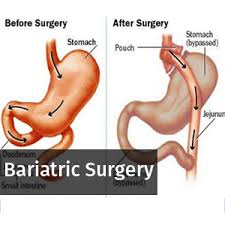- Home
- Editorial
- News
- Practice Guidelines
- Anesthesiology Guidelines
- Cancer Guidelines
- Cardiac Sciences Guidelines
- Critical Care Guidelines
- Dentistry Guidelines
- Dermatology Guidelines
- Diabetes and Endo Guidelines
- Diagnostics Guidelines
- ENT Guidelines
- Featured Practice Guidelines
- Gastroenterology Guidelines
- Geriatrics Guidelines
- Medicine Guidelines
- Nephrology Guidelines
- Neurosciences Guidelines
- Obs and Gynae Guidelines
- Ophthalmology Guidelines
- Orthopaedics Guidelines
- Paediatrics Guidelines
- Psychiatry Guidelines
- Pulmonology Guidelines
- Radiology Guidelines
- Surgery Guidelines
- Urology Guidelines
Bariatric Surgery effectively controls BP in Obese Patients : GATEWAY trial

In a randomized GATEWAY trial, it has been found that Bariatric surgery may be an effective strategy for blood pressure control in patients with obesity and hypertension.The results of the trial were presented at AHA2017 meeting in Anaheim, CA, and published in Circulation.The GATEWAY trial showed that gastric bypass surgery along with medical therapy results in significantly better BP control compared with medical therapy alone among middle-aged obese patients with HTN.
Carlos Aurelio Schiavon, MD, PhD, et al. conducted a randomised trial with a goal to assess the safety and efficacy of bariatric surgery in improving blood pressure (BP) control among obese patients with hypertension (HTN).The researchers looked at 100 patients with hypertension and a body mass index between 30.0 and 39.0 kg/m2. Patients were randomized to Roux-en-Y gastric bypass plus medical therapy, or medical therapy alone.
The primary endpoint – a reduction of ≥30 percent of the total number of antihypertensive medications while maintaining systolic and diastolic blood pressure <140 mmHg and 90 mmHg, respectively, at 12 months. It was noted that there was a 30% reduction in the number of antihypertensive medications while maintaining controlled BP, for gastric bypass vs. medical therapy, 83.7% vs. 12.8%, relative risk 6.6, 95% confidence interval 3.1-14.0, p < 0.001.
Secondary outcomes for gastric bypass vs. medical therapy:
- Remission of HTN: 51% vs. 0%, p < 0.05
- BMI: 26.8 vs. 36.3 kg/m2, p < 0.001
- Waist circumference: 86.9 vs. 109.8 cm, p < 0.001
- Fasting plasma glucose: 84 vs. 98.4 mg/dl, p < 0.001
- Low-density lipoprotein cholesterol: 86.9 vs. 116.5 mg/dl, p < 0.001
- 10-year FRS: 4.5 vs. 6.8%, p = 0.04
- Mortality: 0 vs. 0
- Rehospitalization: 12% vs. 0%, p = 0.03
- Anemia: 20% vs. 10%, p = 0.23
In a post-hoc analysis, 11 patients from the gastric bypass group and none in the medical therapy alone group were able to achieve SPRINT levels without antihypertensives.
The authors concluded that the results of this trial indicate that gastric bypass surgery results in significantly better BP control compared with medical therapy alone among middle-aged obese patients with HTN. More than one-half of the patients in the gastric bypass arm was no longer hypertensive at 1 year of follow-up.They, however, have opined that due to the morbidity of surgery, not all patients with obesity and hypertension with similar characteristics to those included in their trial should be subjected to bariatric surgery.
For more details click on the link:
http://circ.ahajournals.org/content/early/2017/11/10/CIRCULATIONAHA.117.032130

Disclaimer: This site is primarily intended for healthcare professionals. Any content/information on this website does not replace the advice of medical and/or health professionals and should not be construed as medical/diagnostic advice/endorsement or prescription. Use of this site is subject to our terms of use, privacy policy, advertisement policy. © 2020 Minerva Medical Treatment Pvt Ltd